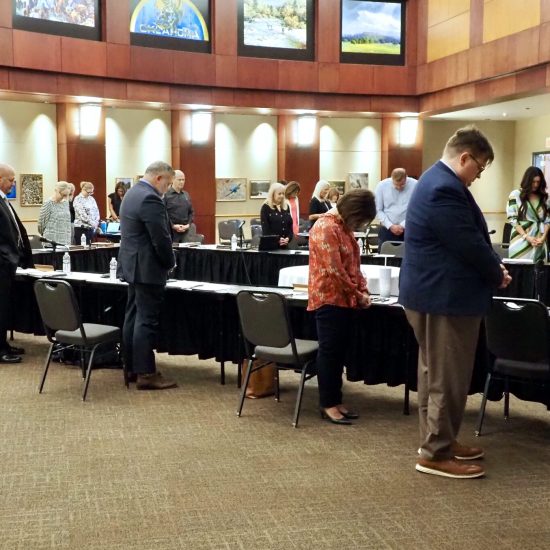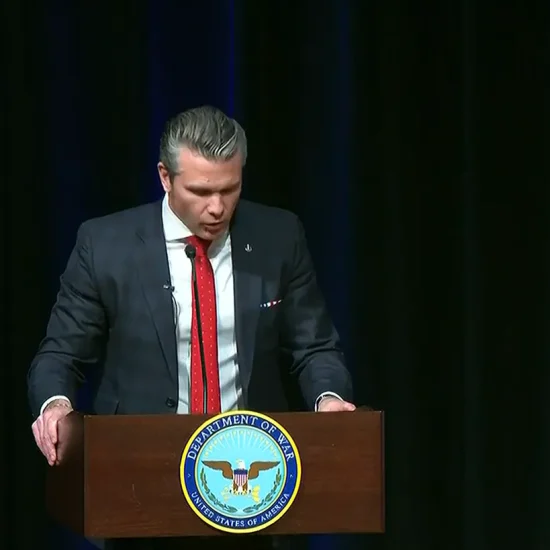
Across the country, state lawmakers recently returned to their chambers to pass important matters like putting up little signs in schools to magically make our society better. Despite all the woes facing our children — like getting shot between 3rd and 4th period, or worrying if their parents can afford to buy groceries despite working fulltime jobs — our lawmakers instead think the best use of time and taxpayer money is posting “In God We Trust” signs everywhere as some sort of mystical totem.

Brian Kaylor
Legislators filed such bills in more than half of our states over the last few years as part of the “Project Blitz” effort to chip away at church-state separation. States enacting legislation requiring public schools post “In God We Trust” include Arkansas, Florida, Kentucky, Louisiana, Mississippi, South Dakota, Tennessee, Utah, and Virginia. Other states — like Alabama, Arizona, Oklahoma, and Texas — have passed bills allowing and encouraging (but not requiring) such posting.
And other states are considering such bills this year, like Indiana and New Mexico. In Missouri, there are actually three such bills (and another requiring the posting of the statement in public buildings). No word yet on if the schools will have to post “In God We Trust” extra times if lawmakers pass each bill.
Proponents of the bills say the signs will improve morality in our schools and even culture.
“In a time of rampant drug use, increased school violence, and mounting cases of suicide among our youth, we need God in our schools now more than ever,” a state legislator in Kentucky claimed after he filed a bill requiring the post of “In God We Trust” in schools.
Wow, that’s an amazing sign! Slap one slogan on a wall and drug use, violence, and suicide rates go down. In that case, why stop there? We should post this phrase everywhere and watch the miraculous transformation!

Pixabay
For instance, we could put this phrase on our money. Imagine that! Then whenever you tried to spend your money on something immoral, your currency just wouldn’t let you do it. You put a quarter in the slot machine, but it just keeps popping out once the words “In God We Trust” touch the machine. Or you go to the bar to get drunk, but the phrase sticks like a magnet to your wallet and won’t let the dollar bills come out.
Then how about we adopt the phrase as our national motto. That could do wonders! Our nation would never again do ungodly things like kill people or treat people differently just because of the color of their skin. I bet we would even have a glorious land where no one was homeless or institutionalized or, well, anything bad. How could we with that magical motto?
Perhaps we could even try putting the phrase “under God” in our pledge. Just think what that would do for our country! Each day in our schools, children would be dropping to their knees to accept Jesus as Lord while the teacher leads them in admiring the flag. And every government meeting that started with such a pledge would mean no immoral bills would pass, like those punishing the poor or endorsing idolatry. The lawmakers would start to push the “yay” button but then their hand would instinctively switch to “nay.”
Oh.
Then, again, maybe none of those things would happen. Perhaps forced religion doesn’t actually work. Maybe, as that ol’ Baptist Roger Williams said, “forced worship stinks in God’s nostrils.” The state can post God’s name everywhere but it wouldn’t mean anyone would change their hearts. Instead, it might just be another way of taking God’s name in vain.
Frankly, I sometimes wonder when our money says “In God We Trust” if it is just bragging about itself. For as Jesus taught, one cannot serve both God and the god called Mammon.
Thus, may we be reminded this legislative session that being American does not get you to heaven any more than being born in a garage makes you a car. To conflate being American with being Christian is to attempt to water down the basic teaching that Jesus alone is the Way, the Truth, and the Life. To suggest otherwise with a school poster just stinks.
Brian Kaylor is editor and president of Word&Way.






